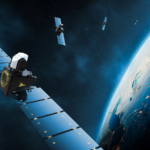Story updated April 19
WASHINGTON — A surge in demand for small satellites to support national security space programs is exposing weaknesses in the U.S. space industrial base, leading to supply chain issues as the military prioritizes rapid deployment of constellations.
In the latest sign of the strain, defense contractor L3Harris Technologies has sued one of its suppliers, the aerospace firm Moog Inc., in federal court, alleging Moog failed to timely deliver critical satellite components and that parts it did provide were defective.
The lawsuit, filed in late March in the U.S. District Court for the Middle District of Florida, is the latest flashpoint in the space industry’s struggle to adapt to the military’s shift toward smaller, more affordable satellites, led by the Space Development Agency.
Established in 2019, the Space Development Agency (SDA), now part of the U.S. Space Force, is upending the longtime model of the military purchasing large, expensive satellites at long intervals. Instead, the SDA plans to spend about $4 billion a year on a proliferated constellation of hundreds of smaller, less costly satellites to be deployed on a more frequent cadence.
This model is placing new demands on suppliers.
According to the March 28 complaint, L3Harris subcontracted with Moog to provide satellite buses — the core hardware used to build spacecraft — and software worth a total of $77.9 million to fulfill two prime contracts — one with the SDA and another with a classified government customer.
L3Harris alleges Moog repeatedly missed delivery deadlines, with satellite buses arriving 11 to 13 months late. “Moog’s failure has also damaged L3Harris’ credibility with its customer and placed future L3Harris business at significant risk,” said the complaint.
Moog eventually delivered the buses and SDA was able to launch L3Harris’ satellites in February. In the lawsuit, L3Harris says it discovered defects in the Moog hardware that “created the potential for catastrophic loss to the satellites” and SDA’s mission.
In response to questions from SpaceNews, a spokesperson for L3Harris said the company could not comment on ongoing litigation.
Aaron Astrachan, Moog’s director of investor relations, said in a statement, “We are aware of the suit filed by L3Harris and are not intending to publicly comment on the allegations at this time. However, we intend to vigorously defend against the allegations, and in due time, will respond to the complaint in court.”
Industry struggling to ramp up
The lawsuit underscores the challenges facing the space supply chain as it tries to ramp up production to meet soaring demand from the military and intelligence community.
Much like the companies that emerged to support surging iPhone component orders, space companies are scrambling to prove themselves as reliable, high-volume suppliers of buses, hardware and software.
Experts say companies in the defense industry, long accustomed to building a few large, complex satellites, are adapting to the new reality of producing larger quantities of smaller, cheaper spacecraft. And a surge in demand fueled by SDA is exposing weaknesses in segments of the space industrial base.
SDA’s director Derek Tournear has often said the agency’s vision is to foster a robust and diverse marketplace. Fixed price contracts are awarded to incentivize speed and technical maturity in bids. And Tournear has pointed out that SDA’s business model focuses primarily on schedule.
In an effort to provide incentives for companies to invest in production capability, SDA competitively selects prime contractors that every two years bid for each tranche of SDA’s space network in low Earth orbit, known as the Proliferated Warfighter Space Architecture.
During a meeting with reporters April 10 at the Space Symposium in Colorado Springs, Tournear noted that some suppliers have had difficulties ensuring access to components and subcomponents, some of which are produced by only one or two vendors.
A case in point is a critical satellite component made by Innoflight, the sole provider of the type 1 encryption required for SDA’s satellites. Type 1 encryption is necessary for transmitting sensitive national security data, and it can take years to obtain National Security Agency approval for the specialized hardware.
Tournear said Innoflight is in an extraordinary position in the market, being the only provider today that has the right size and form factor type 1 encryption that meets SDA requirements.
“Everyone is extremely dependent on Innoflight,” he said. “We have a few alternatives for encryption in the future, but they probably won’t be ready until the Tranche 3 timeframe.” Tranche 3 is the next SDA procurement of satellites planned for 2025 and 2026.
“The good news is that vendors are able to pivot,” Tournear said. “We saw that with Astra.” Some SDA prime contractors selected Astra Space as a supplier of spacecraft propulsion. But after Astra experienced financial troubles several vendors had to find alternative sources for satellite thrusters, he noted.

L3Harris’ legal battle with Moog, meanwhile, speaks to the challenges that prime contractors have faced finding bus providers that can meet the reliability and schedule requirements.
For the next tranche of satellites L3Harris is building for SDA, projected to launch in 2025, the company switched to bus supplier Maxar Space Systems. Other SDA prime contractors like Lockheed Martin and Northrop Grumman are using buses from Terran Orbital and Airbus, respectively. Other prime contractors, including York Space Systems, manufacture their own buses. Rocket Lab said it plans to develop a new bus for SDA.
A new entrant in the SDA market, Sierra Space, is designing its own buses but using components from Raytheon’s subsidiary Blue Canyon Technologies. Sierra Space won a Tranche 2 contract from SDA to produce 18 satellites.
Raytheon last year won a contract as a prime contractor to produce seven Tranche 1 satellites for SDA but later decided it could not meet the price targets, Tournear said. “A lot of the work is being de-scoped off of that contract,” he said. “Raytheon, through executing that contract, realized that the scope that they had chosen in the price point wasn’t going to close.”
Tournear said some of the components that Raytheon had planned to use for its satellites “are flowing into some of the Tranche 2 vendors.”
Sierra Space said in a statement that it has partnered with Blue Canyon for “several key spacecraft components on our buses.”
Criticism from top official
Supply chain problems across the space industry have drawn criticism from the top U.S. Space Force acquisition official, who called on defense contractors to do a better job of addressing the issues.
In recent comments, Frank Calvelli, the assistant secretary of the Air Force for space acquisition, chastised major primes for “whining” about supply chain challenges rather than taking more proactive steps to solve them.
“Our bigger primes whine about supply chain, and I think they are the ones that have the resources and the assets to actually do something about it,” Calvelli said in February.
Calvelli said companies are still blaming the COVID-19 pandemic for their supply chain woes, but he does not believe that is a legitimate excuse anymore.
There are, however, real problems in the space supply chain, Steve Kiser, partner at Veteran Ventures Capital, said April 9 during a panel discussion at the Space Symposium.
“I don’t think we’re paying close enough attention to supply chain problems,” said Kiser. “If you’re an investor and you’re looking at a company, pay extra, extra attention to the security of the supply chain. We’re already seeing cracks in the supply chain with today’s space industry. Imagine what it’s gonna be like in three years.”
Several executives who spoke with SpaceNews on condition of anonymity noted that SDA has created an entirely new market, exposing growing pains in the U.S. space industrial base.
It’s the responsibility of the industry to sort out supply chain problems and adapt to the new paradigm of small satellite constellations, these sources said. But they argue that the issues seen with SDA’s suppliers point to deeper, systemic challenges that can’t be rapidly fixed. They cautioned that some of the companies capable of building the satellites that SDA seeks are structured to produce single-digit numbers of spacecraft at a time, and will need time and effort to ramp up production to meet SDA demands.
According to these sources, the new growth in demand for military satellites has created real bottlenecks, not just with cutting-edge subsystems like type 1 encryption, but also with routine components like batteries, thrusters and solar arrays. Prime contractors have been working to qualify multiple suppliers for key components, but that process can be time-consuming given the exacting specifications.
With the SDA’s ambitious plans to field hundreds of small satellites in the coming years, experts pointed out, resolving the supply chain challenges will be critical to the agency’s success.
Related
Author Profile
- Space.com is an online publication focused on space exploration, astronomy, skywatching and entertainment, with editorial teams based in the United States and United Kingdom
Latest entries
 ScienceMay 4, 2024BAE Systems wins $365 million contract to build geostationary weather instrument
ScienceMay 4, 2024BAE Systems wins $365 million contract to build geostationary weather instrument ScienceMay 4, 2024NRO’s first batch of next-generation spy satellites set for launch
ScienceMay 4, 2024NRO’s first batch of next-generation spy satellites set for launch ScienceMay 4, 2024Failure is not an option: learning from Apollo 13
ScienceMay 4, 2024Failure is not an option: learning from Apollo 13 ScienceMay 4, 2024Millennium Space lands $414 million contract to build missile-tracking satellites
ScienceMay 4, 2024Millennium Space lands $414 million contract to build missile-tracking satellites

